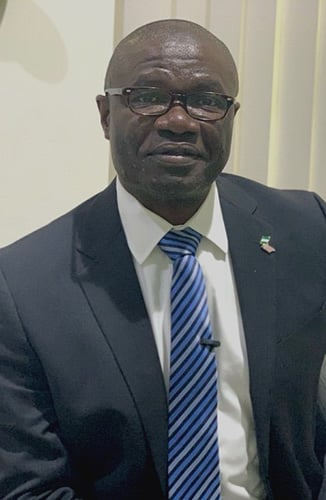Long dependent on external funding and expertise, African institutions are now building infrastructure, training local talent, and taking control of critical research operations, from genomic sequencing to diagnostics manufacturing.
One of the leading voices in this shift is Christian Happi, director of Nigeria’s Institute of Genomics and Global Health (IGH), listed among Time magazine’s 100 most influential people in 2025.
In this interview with SciDev.Net, Happi outlines the lessons from the COVID-19 pandemic, the risks of donor dependency, and the urgent need for homegrown investment and coordination ahead of future global health crises.
Your institute is championing a different research model in Africa that is based on self-reliance, what does this mean?
At IGH, we’ve transformed how research operates in Africa. Instead of exporting raw samples abroad like unprocessed minerals, we now perform full genomic sequencing locally.
We transform samples into data here before any international sharing. This allows us to create new knowledge and innovations within Africa.
During COVID-19, we sequenced Africa’s first SARS-CoV-2 genome within 48 hours — faster than most global labs. We discovered the Beta and Omicron variants because we built this local capacity.
This represents a fundamental shift: Africa has moved from consuming knowledge to producing knowledge that others consume.
How have you made your institute self-sufficient despite poor infrastructure?

Christian Happi, director of the Institute of Genomics and Global Health (IGH), Nigeria.
We’ve taken radical steps to achieve operational independence. We generate 1.4 megawatts of solar power, freeing us completely from the unreliable electrical grid.
We built our own water treatment plant to secure pure water. We even produce our own liquid nitrogen — not just for our needs, but with capacity to supply others.
These systems form our foundational freedom. Visitors from Rwanda, Kenya and beyond come to study this model because it demonstrates how African labs can overcome environmental constraints through self-engineered solutions.
With major funders like the US National Institutes of Health (NIH) scaling back, how are you plugging the gap?
While our NIH grants were impacted, including our International Center of Excellence in Malaria Research project, we anticipated such volatility.
We’ve diversified through African philanthropic support, with local entrepreneurs providing multimillion-dollar commitments recognising genomics as strategic investment.
We’re developing revenue streams like diagnostic services and training programmes.
Crucially, we engage African governments differently, advocating that research isn’t charity but strategic infrastructure. Nigeria’s presidential office for vaccine development exemplifies this shift in thinking that we’ve championed.
What advice would you give to African scientists facing similar challenges?
Diversify urgently. An NIH grant’s competitiveness validates your science, so use that credibility to pitch the same project to European, Asian, or African funders.
We’re engaging African philanthropists (who now support us with multimillion-dollar grants) and developing self-sustaining models: IGH runs on solar power, produces its own liquid nitrogen, and sells services.
Should African governments play a bigger role in research funding?
They must. Nigeria’s new presidential office for vaccine development shows political will exists. Rwanda, Senegal, and South Africa are investing in vaccine factories.
But commitment needs cash: Africa spends about one per cent of GDP on research and development, versus two to three per cent in developed nations.
Without budgets reflecting science’s strategic value, breakthroughs won’t reach clinics.
Your work now includes human genomics. Why this shift?
Our expansion into human genomics is deliberate.
Pathogens drive genetic diversity in African populations — malaria resistance explains sickle cell prevalence, for instance. By sequencing Nigerians with conditions like kidney disease or diabetes, we find mutations ignored in European datasets.
This isn’t academic, it’s translational. We’re designing CRISPR diagnostics based on African genetic susceptibility to malaria. No foreign lab can do this effectively because they lack our contextual understanding of how pathogens and genomes interact uniquely here.
What practical lessons from IGH could other African research centres adopt to become more resilient?
First, absolute ownership of our ecosystem — controlling energy, water, and data generation rather than outsourcing them.
Second, prioritising translation. We don’t just publish papers, we develop patents and tools. Our CRISPR diagnostics are moving toward commercialisation.
Third, building pan-African networks rather than isolated labs. We actively mentor other African institutions because fragmentation wastes resources.
When the next pandemic hits, Africa needs coordinated capacity, not scattered competence.
This is strategic sovereignty — creating African solutions for African challenges through systemic self-reliance.
What gives you hope amid funding cuts?
The changing landscape itself motivates us. Young scientists across Africa are building AI tools to predict outbreaks without waiting for permission. This shift, from dependency to self-determination, is irreversible.
While the NIH situation presents challenges, it ultimately accelerates Africa’s recognition that research sovereignty isn’t optional.
Our model proves that when given resources, African scientists don’t just perform — we redefine what’s possible in global science.
And what worries you?
Another pandemic. COVID exposed our fragmented systems. If a new pathogen emerges amid this funding crisis, uncoordinated labs and scarce resources could spell disaster.
That’s why I fight for resilient African networks — not just for the continent, but because global health depends on it.
This piece was produced by SciDev.Net’s Sub-Saharan Africa English desk.
www.scidev.net (Article Sourced Website)
#Aid #cuts #call #African #selfreliance #research
